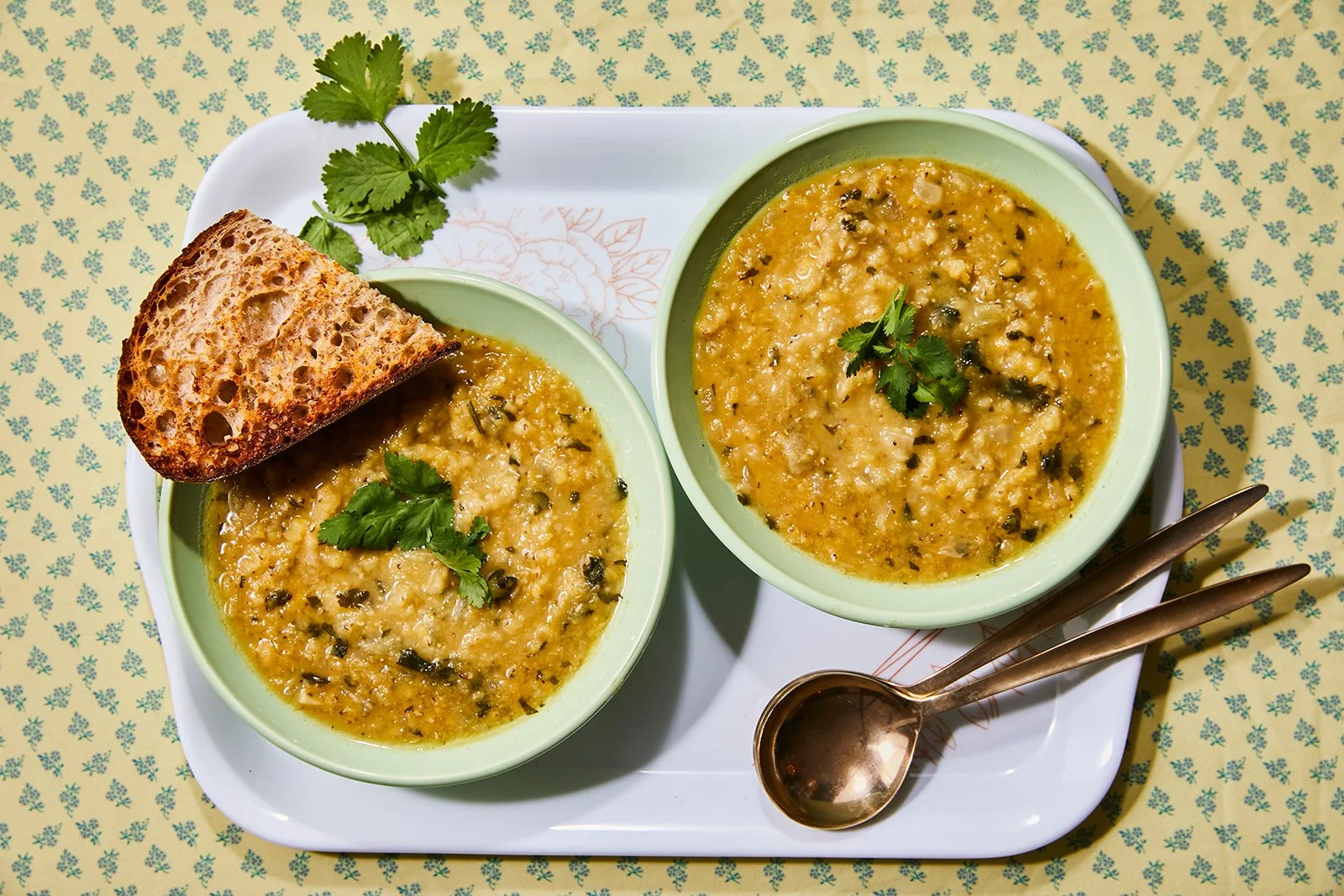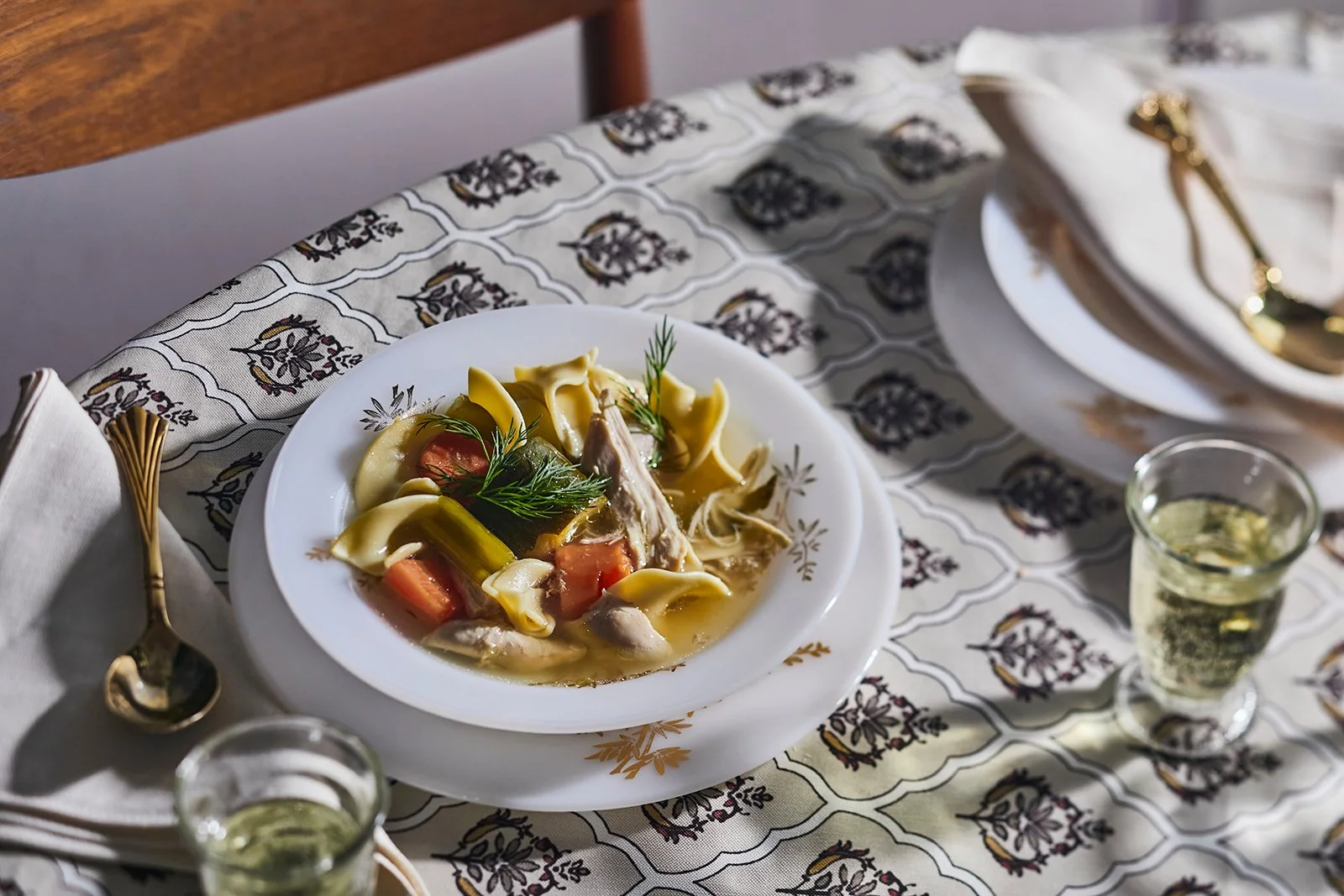The Lentils That Sustained a Family as They Fled Syria
Shared by Adeena Bleich and Sharon Fargo
Recipe Roots: Qamishli, Syria > Nesher, Israel > Los Angeles
In 1961, Sharon Fargo’s grandparents Nachum and Fahimah set out for Israel from Qamishli, a small city on the northern border of Syria, not far from Turkey. It was illegal to emigrate from Syria to Israel at the time, so they fled at night, hiding valuables in their undergarments, carrying flatbread with meat called lahmajoun and lentils or adas, both cooked and dried, to fortify them as they traveled first to Istanbul and finally to Israel.
The couple traveled as part of a group of 22 people: a few adults, several orphans, and their eight children including 10-month-old Perach. The journey was arduous. Some of the kids lost shoes in a river they crossed and Perach, who had jewelry concealed in her diaper, wailed. The group told Fahima, she “would have to leave the baby in the wild or the Syrian border guards might find them and kill them all,” Sharon told his wife Adeena last year when she wrote down the family story. Heartbroken, she left the baby under a tree. A day later, unable to go on, Fahima sent her eldest son to find Perach, knowing she might not be alive. Miraculously, the baby survived and the entire group managed to cross the border and made it to Israel.
“That baby was my mother,” Sharon added. For much of her life, few in the family knew the full story. In many Sephardic and Mizrahi families, Adeena explains, older generations “didn’t retell their stories of trauma, because they didn’t want the next generation to take that trauma.” Passionate about history, she started to ask questions of Sharon’s relatives, helping unearth the story of the journey. When Adeena and Sharon celebrated their wedding, they shared it — along with a story from Adeena’s side of the family — with their guests. Had the family not retrieved Perach, Adeena explains, she wouldn’t have been standing at her wedding.
When Perach would visit Adeena and Sharon in Los Angeles, Adeena would ask her mother-in-law to teach her the family recipes including those for stuffed vegetables, lahmajoun, an overnight dish wheat berries and chicken called harissa, and the lentils, which the family ate on their journey and when Sharon was growing up in Israel. Today, Adeena makes them for their two little children and continues to share the story of Sharon’s family often. “To me, it’s more than just food, it’s history, and it’s a beautiful history that I don't want to get lost,” she says.
Shorbat Adas (Red Lentil Soup)
Makes: 4 servings
Total Time: 40 minutes
Ingredients
3 tablespoons vegetable oil
1 yellow onion, finely chopped
2 cups dried red lentils
1 teaspoon ground coriander
¼ teaspoon ground sweet paprika
6 cups water
¼ bunch fresh cilantro leaves, roughly chopped
1 ½ teaspoons kosher salt
Preparation
1. Place the oil into a pot over medium heat and add the onions. Saute the onions for 5-8 minutes until softened and translucent, mixing often.
2. Add the red lentils, ground coriander, paprika, water, cilantro and kosher salt. Mix well and bring the mixture to a boil. Reduce heat to low, cover with a lid and cook on a simmer for about 25 minutes or until the lentils have broken down and the soup thickens.
3. Serve the soup hot with bread on the side.
Harissa (Overnight Chicken and Wheat)
Photos by Lauren Volo, Food Styling by Mariana Velasquez
In Medieval Spain, Jews ate a pounded porridge of wheat and chopped meat called harissa on Shabbat that was of Persian Sassanian origin, writes culinary scholar Claudia Roden in “The Book of Jewish Food: An Odyssey From Samarkand to New York.” Dishes by the same name, historically, were served in Iraqi, Persian, Syrian, and Sephardic homes, but recipes vary, she adds, with some using wheat and others rice. Mutton is commonly called for, but chicken is used in some traditions. In Sharon’s family, a dish by the same name is made with a whole chicken and the wheat isn’t mashed, instead it holds on to its nutty quality and structure. Be sure to start preparing the dish the day before you plan to eat it as it cooks through the night.
Makes: 6 servings
Total Time: 8 hours or overnight
Ingredients
1 ½ cups wheat berries
1 whole chicken
4 teaspoons kosher salt, divided
¼ cup vegetable oil
4-5 hard boiled eggs, unpeeled
Enough boiling water to cover the chicken (about 4-5 cups)
Preparation
1. Preheat the oven to 250°.
2. Place the chicken into the center of a large dutch oven. Season all the surfaces of the chicken with 2 teaspoons of salt. Pour the wheat berries around the chicken in the pot. Sprinkle the wheat berries with the remaining salt.
3. Place 2 eggs on each side of the chicken (on top of the wheat berries). Pour the oil over the chicken, wheat berries and eggs and then pour the boiling water into the pot.
4. Place a lid on the pot and transfer into the oven. Cook for 8 hours or overnight until the chicken is browned and cooked and the wheat berries are cooked and melted into the juices of the pot.
5. Serve hot.











